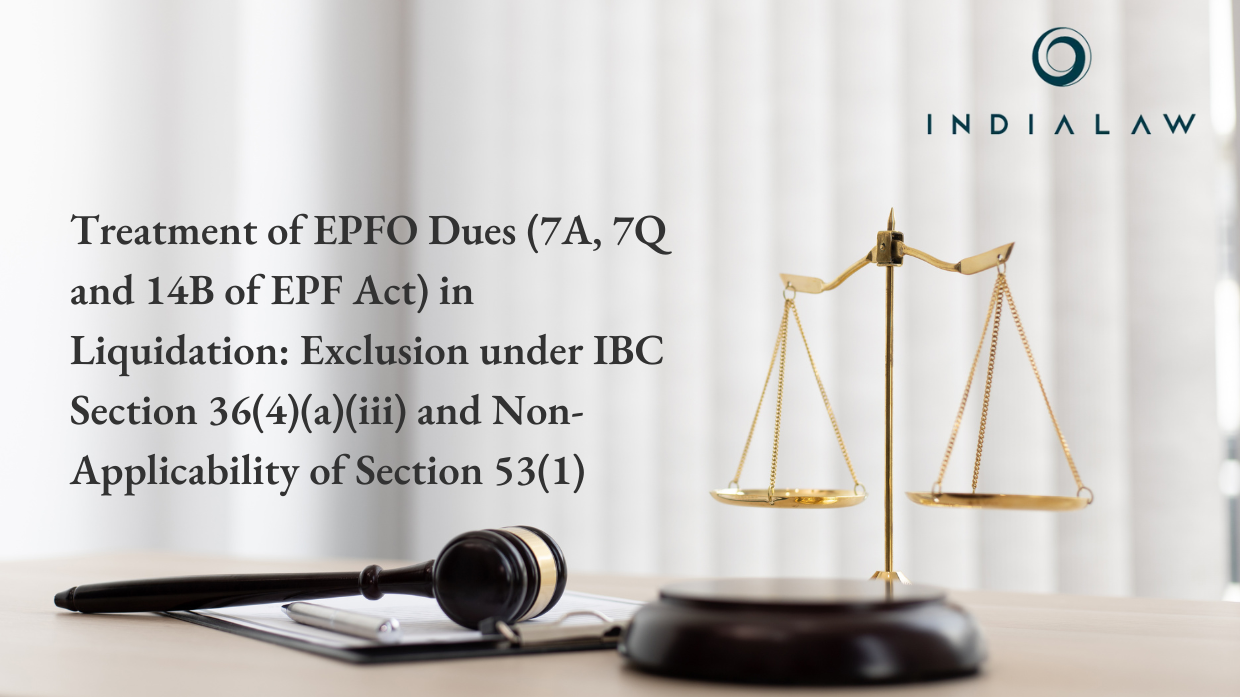Treatment of EPFO Dues (7A, 7Q and 14B of EPF Act) in Liquidation: Exclusion under IBC Section 36(4)(a)(iii) and Non-Applicability of Section 53(1)

Introduction:
In the case of Mr. Anuj Bajpai vs. Employee Provident Fund Organisation & Ors.[i], Liquidator submitted that Contribution under Section 7A should have been treated in accordance with Section 36(4) of the Code and, Interest under Section 7Q and Damages under Section 14 B should have been dealt in accordance with Section 53 of the Code. Hon’ble NCLAT in this case had referred to the case of Maharashtra State Cooperative Bank vs Assistant Provident Fund Commissioner & Ors.[ii], and held that the dues payable to the workers and employees as per 7Q and 14B of the EPF Act, will also be covered as for the purpose of Section 11(2) of the EPF Act. The Hon’ble Bench had also referred to precedents of Sunil Kumar Jain & Ors. vs Sundaresh Bhatt & Ors.[iii], Jet Aircraft Maintenance Engineers Welfare Association[iv] and SBI v. Moser Baer Karmachari Union[v] and finally held that contention of the Liquidator was not tenable and stood rejected and the appeal was dismissed.
Breif Facts:
The Adjudicating Authority admitted Shirt Company (India) Pvt. Ltd (Corporate Debtor) into the Corporate Insolvency Resolution process (CIRP) on 26.02.2020. The Respondents had filed their claims before the Interim Resolution Professional (IRP) and Appellant was appointed as the Liquidator. The former management of the Corporate Debtor had not maintained separate funds w.r.t. pension and provident funds, so the Appellant claimed to treat the Respondent’s claims under the waterfall mechanism as per Section 53 of the Code.
The Respondents started the recovery process in accordance with the EPF Act and created a charge on the Corporate Debtor’s property. The Appellant came to know about the charge through the public auction notice issued by him and filed an application seeking interim relief against the charge. The Appellant vide order dated 13.12.2022 was granted interim reliefs with order to create fixed deposit for the claims of Respondents. The Appellant created a fixed deposit for the claimed amount and filed applications for erroneous claims and rectification of the order dated 13.12.2022.
The Adjudicating Authority partially allowed the applications and pronounced the Impugned order on 30.06.2023. The Adjudication Authority, through the order declared the claims of the Respondents to be treated as per the waterfall mechanism as per Section 53 of the code. The Appellant filed an appeal stating that the Adjudicating authority failed to examine the different components of the claims, violating Section 53 of the Code.
Contentions:
In the Appellant’s case, the Adjudicating Authority had failed to examine the different components of the claims and treated everything as contributions which had violated Section 53 of the Code. Appellant further stated that the EPF Act is for the welfare of the workers and submitted that Section 7A of the EPF Act, only amounted to contributions for the benefits of employees and workers and the Impugned Order had wrongly treated all the claims not in the spirit of the code.
Also, the Appellant pointed out that there is a specific provision in the Employee Provident Fund Scheme, which made clear that contributions under Section 7 of the EPF act along with interests are payable to members. Appellant submitted that Section 7Q and 14B cannot be given priority under Section 36(4) of the Code and could only form as part of waterfall mechanism under Section 53 of the Code.
The Respondents denied the Appellant’s claims, stating that PF dues should be considered as a whole and not divided into components. They argued that claims under Sections 7Q and 14B are for worker welfare measures and that the Corporate Debtor has failed to remit all dues. They argued that the EPF Act provides powers for them to recover dues, despite the Corporate Debtor’s failure to do so.
The respondents argued that the failure to remit the amount led to the respondents seeking the contribution, interest, and damages, which are workers’ rights and should be prioritized under the EPF Act’s payment scheme. The Respondents referred to the Supreme Court’s case of Maharashtra State Cooperative Bank (Supra)[vi], where a corporate debtor is liable for employer default on contributions, highlighting the importance of timely payment.
The Respondents challenged the locus of Appellant to file the Appeal, and finally submitted that all sums due to any workmen or employee should be excluded from the liquidation estate as stipulated in Section 36(4) (iii) of the Code and requested the Appellate Tribunal to dismiss the Appeal.
Decision of Tribunal
From the arguments of the parties, the Hon’ble NCLAT observed three issues which were interlinked and had to be discussed in a conjoint manner.
- Whether provident fund dues are to be decided and distributed in accordance with Section 36(4)(iii) of the Code or in accordance with Section 53 of the Code?
- Treatment of the various components of claims of the EPFO (the Respondent herein) i.e., contribution under Section 7A, interest under Section 7Q and damages under Section 14 of the EPF Act and whether all these will constitute as PF Dues in terms of EPF Act?
- What Constitutes the part of liquidation estate and what does not constitute part of liquidation estate in terms of the Section 36 of the Code especially, w.r.t Provident Fund dues?
The Hon’ble NCLAT further observed that as per the definition of liquidation estate mentioned in Section 36(3)(a) to (i) and assets not to be included in liquidation estate mentioned in Section 36(4)(a) to (e), any due to workmen or employee from the provident fund, pension fund and gratuity fund have to be excluded from the liquidation estate. Further, the Hon’ble NCLAT noted that the EPFO Authorities have been entitled with powers under the provision of Section 14B of the EPF Act, to determine the amount dues from the employer. It was also noted that Section 11(2) of the EPF Act provided for any amount due from the employer to be paid in priority to all other debts. The Hon’ble NCLAT relied on the judgement of Maharashtra State Cooperative Bank (Supra)[vii] which stated that the amendment in Section 11 of the EPF Act, which added sub-section 2, did not restrict the meaning of “any amount due from the employer” and covered dues payable under Sections 7Q and 14B of the act.
The Hon’ble NCLAT also referred to cases in Sunil Kumar Jain (Supra)[viii] where the Supreme Court held that the dues of the gratuity and pension shall be governed by Section 36(4) of the Code; in Jet Aircraft Maintenance Engineer’s Welfare Association[ix] where the Appellate Tribunal’s Order was upheld by the Supreme Court and where it was held that PF and ESI funds are not part of the Corporate Debtors Estate; and in case of State Bank of India (Supra)[x], The Appellate Tribunal ruled that Section 36(4)(a)(iii) of the Code cover all sums due to any workmen or employee from provident fund and the gratuity fund and the same should not be included in liquidation estate and further held that the liquidation estate/ assets of the corporate debtor under Section 36(1) read with Section 36 (3) of the Code, do not include sums due to any workman and employees from the provident fund, the pension fund and the gratuity fund, for the purpose of distribution of assets under Section 53 of the Code. It was decided that the dues are to be paid to the workmen/employees on priority, without reference to or waiting for distribution of liquidation assets as per the waterfall mechanism under Section 53 of the Code.
Thus, the Hon’ble NCLAT couldn’t find any merit and dismissed the Appeal with no Costs.
[i] Company Appeal (AT)(Ins.) No. 1141 of 2023 & I.A. No. 3979 of 2023
[ii] (2009) 10 SC 123
[iii] (2022) 7 SCC 540
[iv] (2023) SCC Online NCLAT 2363
[v] (2019) SCC Online NCLAT 447
[vi] Supra ii.
[vii] Supra ii.
[viii] Supra iii.
[ix] Supra iv.
[x] Supra v.
By entering the email address you agree to our Privacy Policy.



